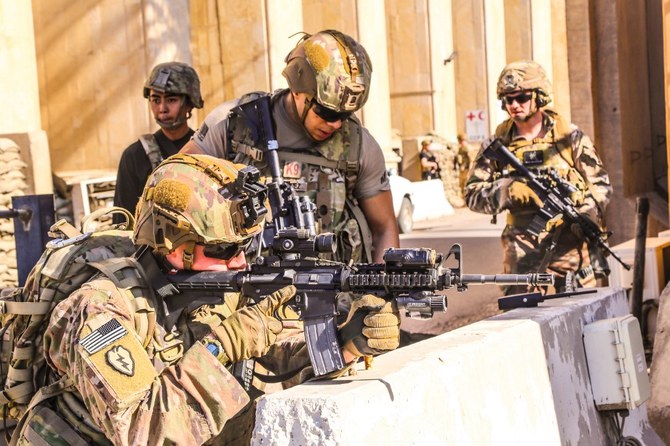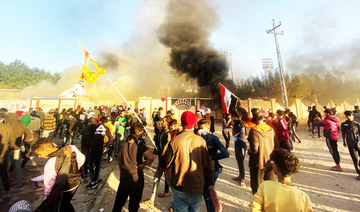BAGHDAD: The United States has no plans to pull American troops out of Iraq, Defense Secretary Mark Esper said on Monday, following reports by Reuters and other media of a US military letter informing Iraq officials about the repositioning of troops in preparation to leave the country.
The developments come in the aftermath of an American drone strike ordered by US President Donald Trump that killed Iranian military commander Qassem Soleimani, widely seen as Iran’s second most powerful figure behind Supreme Leader Ayatollah Ali Khamenei.
“There’s been no decision whatsoever to leave Iraq,” Esper told Pentagon reporters when asked about the letter, adding there were no plans issued to prepare to leave.
“I don’t know what that letter is... We’re trying to find out where that’s coming from, what that is. But there’s been no decision made to leave Iraq. Period.”
The United States has about 5,000 US troops in Iraq.
The letter was a poorly worded draft document meant only to underscore increase movement of US forces, the top US military officer told reporters.
“Poorly worded, implies withdrawal. That’s not what’s happening,” US Army General Mark Milley, chairman of the military’s Joint Chiefs of Staff, said, stressing there was no withdrawal being planned.
The authenticity of the letter, which was addressed to the Iraqi defense ministry’s Combined Joint Operations Baghdad and signed by a US general, had been confirmed to Reuters by an Iraqi military source.
Esper added the United States was still committed to countering Daesh in Iraq, alongside America’s allies and partners.
Germany is moving some of its military personnel from Iraq to neighboring countries over security concerns, the government told lawmakers, days after the killing of a top Iranian military commander in a US drone strike.
About 30 of the 120 German soldiers in Iraq who mainly train Iraqi security forces will be redeployed to Jordan and Kuwait, the government told parliament in a letter on Monday.
The drawdown of German troops was ordered by the US-led joint command for fighting Daesh, the German government said. This would apply mainly to troops in Baghdad and Taji, a city just north of the Iraqi capital where close to 30 German troops are deployed.
Out of the 120 German soldiers, about 90 are stationed in the Kurdish area in the north of the country.
The German government said the forces could be moved back to Iraq if their training mission resumes.
Several helicopters could be heard flying over Baghdad on Monday night. It was not immediately clear if this was a related development. The letter said coalition forces would be using helicopters to evacuate.
In Tehran, Khamenei wept in grief with hundreds of thousands of mourners thronging the streets of the Iranian capital on Monday at Soleimani’s funeral. He was killed by a US drone at Baghdad airport on Friday.
“Sir, in deference to the sovereignty of the Republic of Iraq, and as requested by the Iraqi Parliament and the Prime Minister, CJTF-OIR will be repositioning forces over the course of the coming days and weeks to prepare for onward movement,” the letter stated.
It was signed by US Marine Corps Brig. Gen. William Seely III, commanding general of the US-led military coalition against Islamic State.
CJTF-OIR stands for Combined Joint Task Force–Operation Inherent Resolve.
“We respect your sovereign decision to order our departure,” the letter said.
Iran’s demand for US forces to withdraw from the region gained traction on Sunday when Iraq’s parliament passed a resolution calling for all foreign troops to leave the country.
Iraqi caretaker Prime Minister Abdel Abdul Mahdi told the US ambassador to Baghdad on Monday that both nations needed to implement the resolution, the premier’s office said in a statement. It did not give a timeline.
The letter stated, “During this time, there will be an increase in helicopter travel in and around the International Zone (IZ) of Baghdad.” The International Zone is the formal name of Baghdad’s heavily fortified Green Zone, home to government buildings and foreign missions.

























